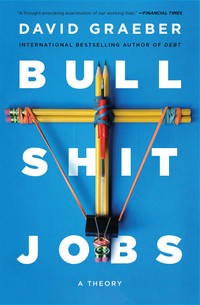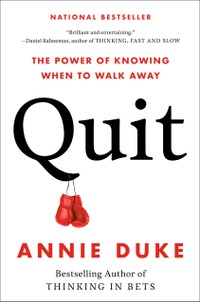What to Read When You Want to Quit
8 min read
Even if you like what you do for a living most days, actually working can be tough. In pursuit of hazy notions of success, many of us spend the prime of our lives jumping through hoops that other people tell us to jump through, or toiling toward a promotion we’re not at all sure is coming. Frequently, labor is less a source of purpose and more a necessity that allows one to pay the bills. And today, many people feel that its demands—mental, emotional, physical—are so great that they are too exhausted to do anything genuinely enjoyable at the end of the day. Other than, perhaps, dream about quitting.
However, this dissatisfaction can also raise important questions. What exactly do we get from our paid employment, and are there other ways we could spend our time? What work should society value?
Books can help a reader think through these issues by analyzing modern employment in unfamiliar or stimulating ways: through a theory of “bullshit jobs,” maybe, or by capturing the particular blend of ennui and guilt that characterizes a truly awful position, or by launching a historical investigation of the weekend. Whether or not you decide to quit (and there’s a book below about how to do that), these seven titles can help you challenge the assumptions that so often accompany professional life—which will help you make your own choices about how, and where, you work.

Bullshit Jobs, by David Graeber
Why do so many jobs nowadays feel soul-crushingly pointless? That’s the central question of this empathetic, outraged investigation by the late anthropologist Graeber, who collected testimonies from dissatisfied telemarketers, middle managers, corporate lawyers, bureaucrats, and office workers. A “bullshit job,” in his parlance, isn’t merely an unpleasant one; instead, it’s “a form of paid employment that is so completely unnecessary or pernicious that even the employee cannot justify its existence.” These jobs often force workers to feign business when they have nothing to do, which keeps them from repurposing that time for more fulfilling ends. This amounts to “spiritual violence,” Graeber writes, no matter how well the employee is compensated. Later chapters examine why these positions are proliferating and what we should do about it; Graeber’s answers (respectively, the growth of “managerial feudalism” and universal basic income), are surprising, provocative, and endlessly interesting. This book’s ambition and sweep invite readers to think harder about how we organize work individually and as a society.


Temporary, by Hilary Leichter
“I have a shorthand kind of career,” the narrator of this delightfully bizarre novel informs us early on. “Short tasks, short stays, short skirts.” Her work life consists of a series of absurd temp jobs, in which she fills in for the chairman of the board of Major Corp (“the very, very major corporation”), a member of the crew on a pirate ship, a murderer’s assistant, and, for a memorable moment, a barnacle. Being a “temporary,” we gradually discern, isn’t just her job description but something much stranger: more like a predestined calling or even a divine curse. As her mother and grandmother did before her, the narrator works through her placements to one day achieve “the steadiness,” a numinous, longed-for feeling of security that all temporaries strive for but few attain. Beneath the novel’s profound weirdness is a sly skewering of the precarity of modern employment, where any kind of permanence can seem like a pipe dream and contentment is often just as elusive. The novel ends on a note of quiet resistance to the all-consuming logic of the workplace: No one, it concludes, can truly be replaced—not even by an extraordinarily competent temp.


Quit, by Annie Duke
No one likes a quitter, the saying goes. But the act of walking away is unfairly maligned, argues Duke, a former professional poker player. “If you quit something that’s no longer worth pursuing, that’s not a failure,” she writes. “That’s a success.” The book begins with a story that becomes a sort of guiding metaphor: In 1996, three mountaineers survived an attempt to summit Mount Everest by wisely turning back while their compatriots forged on and perished. The lesson? Quitting is about preserving your resources—your time, your energy, your life—so that you can climb another day. Duke applies this mindset to all sorts of situations, such as folding a poker hand and dropping a professional project. Her book unpicks the tangle of cognitive biases that make it so hard to give up on a goal—including the fear of wasting time and money you’ve already invested and the desire to remain consistent with your prior actions—and that commit you to roles you should actually jettison. Luckily, quitting is a skill that each of us can cultivate. Duke offers up concrete strategies for figuring out the right time to leave an unsatisfying job or relationship, and suggests ways to sidestep the (real or imagined) pressures to stay the course.

Waiting for the Weekend, by Witold Rybczynski
This charming history of leisure time is also, in a roundabout way, a meditation on work and its purpose. Do we work in order to earn enough money for leisure? Or are weekends and vacations merely breaks in an activity that should be its own reward? Rybczynski charts the creation of the weekend, which he calls “the chief temporal institution of the modern age,” by exploring ancient seven-day divisions of time, the significance of holy days like the Sabbath, and the 18th-century British laborers’ practice of “keeping Saint Monday”—taking that day off—as a way to protect their freedom from encroaching factory work. The modern week, with Saturdays and Sundays off, is a product of urban life and industrialization, and it created rigid boundaries between work and play that shape our experience of free time today. This compression of leisure time can result in “a sense of urgency” that, Rybczynski argues, “leads to the nagging feeling that our free time should be used for some purpose higher than having fun.” Whether or not you feel this pressure, his reflections on what the weekend might potentially give us—a protected period for reflection and renewal away from workaday life—will reframe the way you consider your own avocations.


Personal Days, by Ed Park
If you’ve ever worked a demoralizing white-collar job, Park’s satirical novel will feel instantly familiar. Its protagonists, eight employees at an unnamed New York–based company, wrestle with the arcane formatting glitches of Microsoft Word, speculate about the sex lives of their superiors over drinks, and live in fear of the corporate overlords threatening to buy their company, whom they call “the Californians.” But a shift occurs when one member of the crew, Jill, is suddenly fired and a new employee named Graham—or “Grime,” as everyone calls him, because of his British accent—appears. Mysteries proliferate. What’s the meaning of the cryptic notebook in which someone has copied out inspirational quotes from business self-help books? Or the Post-its with the name Jason scrawled on them? And why is Grime so weird? You’ll keep turning pages in search of the answers to these questions, but the book’s pleasure comes in its pitch-perfect evocation of office culture: the odd blend of intimacy and distance that results when you spend the majority of your time with people whose personal lives you know little about. I laughed—many times—in recognition.

“Bartleby, the Scrivener,” by Herman Melville
Perhaps the most famous quitter in literature is pale, mild-mannered Bartleby, a young man who takes a job copying legal documents in a 19th-century Wall Street office and slacks off more and more until he simply refuses to do anything at all. “I would prefer not to,” he says, first in response to requests to do his job, then to demands that he vacate the office’s premises; eventually, he even declines to eat. Nearly every character who encounters Bartleby finds him deeply unnerving, including the narrator of the short story, Bartleby’s boss, whose conflicted sympathy reflects the reader’s own. But by refusing to comply with other people’s requests even to the point of preposterousness, Bartleby throws our system of rules and norms into sharp relief and allows us to recognize its subtle coercion—all by emphasizing the word prefer. What kind of freedom do we really have, Melville seems to ask, if our choices are so often determined by the expectations of those around us and the structure of society itself? Bartleby’s story endures because his resistance, however nonsensical, holds a mirror up to our own deepest impulses: Perhaps at some level, we would all “prefer not to.”

Momo, by Michael Ende
Momo is a wonderful children’s chapter book about a little girl who lives in the ruins of an amphitheater—but it also delivers a surprisingly sharp critique of our modern obsession with efficiency, because its entire plot revolves around the absurdity of the phrase saving time. Its main antagonists are ominous men clad in gray suits and clutching briefcases, who persuade the inhabitants of a city to invest their spare hours in a “Timesaving Bank”—though in fact, the gray men merely consume the stolen time while everyone else becomes miserable. A barber, for instance, stops chatting with his clients, sells his pet budgie, and puts his frail mother in a nursing home in an effort to cut unnecessary “time-wasting,” and yet he feels he has less time than ever and no longer enjoys his work. People start buying fast food; children are herded into “depots” because their parents have no time for them anymore. Only Momo, whose particular gift is listening to others, is immune to the gray men’s influence, and she must use her patience, attentiveness, and sympathy to put things to rights. This recognizable and damning portrait of our society’s priorities will prompt even adults to wonder what, exactly, we’re saving time for.

When you buy a book using a link on this page, we receive a commission. Thank you for supportingThe Atlantic.



